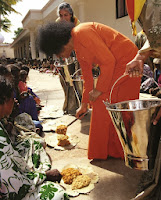PREVIOUS PAGE NEXT PAGE
This section of the blog presents a message of Bhagawan Baba every week. Mostly, it is the form of a question that is answered by Bhagawan, giving us the correct understanding and interpretation of a concept or a term or a practice. So watch out every Sunday for a special message from Bhagawan Baba that could serve as your driving force throughout the week. Wish you a happy week!!
 |
| Bell serves as a visiting card to see God!! |
There is great joy even in listening. It is Naada(Divine sound). There is great power in sound. We have bells in a temple. All who visit the temple ring the bell. Why are bells kept in a temple? Are they kept to wake up God who is sleeping? No, no, no. Those who do not know Vedam, regard this very Naada as Vedam and make God hear this sound.
02 December to 08 December 2013
The Omkaaram must be chanted in a very pleasant, sweet and soft manner. It must sound as though it comes from very far, approaches very close and then goes very far again. The people from urban areas must have experienced this. When the plane is flying somewhere far off, you can hear a little bit of the sound. When it comes close, the sound is heard very loudly. Again when it moves far away, the sound keeps on decreasing. Omkaaram must be chanted in a similar manner.
25 November to 01 December 2013
18 November to 24 November 2013
So students, what do you need to do primarily? Study well and concentrate on our studies. Recognize and develop discrimination with respect to that knowledge. Make an effort to put this knowledge into practice, to the extent possible. I have told a couple of times, there are five types of knowledge. However, students today are ending their pursuit (of knowledge) with just bookish knowledge itself. Some students go further and achieve the level of superficial knowledge. But there is a lack of general knowledge. Discrimination knowledge is totally absent. How then, can one acquire practical knowledge? Therefore, practical knowledge is very important. Because of lack of practical knowledge, our education is very artificial.
11 November to 17 November 2013
 |
| Jagath is nothing but going and coming… |
This world is called Jagath. Jagath means Jaa + Gath, Jaa + Gath i.e. to go and to come, to go and to come. Everything goes and comes. Nothing remains permanently. Nothing goes permanently. Whatever goes, comes again. Whatever comes, goes again. That is why this world is called Nityam (transient). It is also called Sadasat (neither true nor untrue). It is thus referred to as Jagath.
04 November to 10 November 2013
 |
| Bursting crackers within limits has benefits too |
There is a scientific explanation also (for bursting crackers during Diwali). The season that has just gone by is the monsoon season. Wherever you see, you find stagnated water and puddles of water. On account of this unhygienic environment, many germs and insects start increasing in number. Ill health starts progressing in humans because of these germs and insects. By bursting crackers, the fumes and the toxic materials kills these germs and insects. This helps man to be healthy and happy. Bharatiyas started all these festivities and practices with lot of inner significance.
 |
| Narakaa was truly a planet approaching earth |
There is a scientific history (for the story of Narakaasura). There are many planets in the sky. Many planets revolve in this universe. But the nine planets (Navagrahaas) are very important for the planet of earth. There are many more sub-planets too. In the Dwaapara Yuga, a planet called Narakaa was moving very close to the planet earth. If this planet would crash into earth, the entire earth would be turned into ashes. In fact, even if the moon that is so cool would come even a few feet closer to the earth, the earth would be turned into ashes. There can be so many calamities. The planet Narakaa came very close to earth and was about to crash into earth.
What are the four items required to light the lamp of wisdom?
 |
| Light the lamp of wisdom in your heart |
To light a lamp we need four items. One is the container, second is the oil, third is the wick and the fourth is the match box. Even if one of these four items is missing, we will not be able to light the lamp. All these four items are essential. But what type of darkness does this light remove? It dispels only the outer (physical) darkness.
28 October to 03 November 2013
21 October to 27 October 2013
Embodiments of Love! First and foremost recognize your own Divine principle. Recognize the truth as to who you are. The one who recognizes His true Self can understand everything else. There are many new children here. You can recognize your true Self through many small ways.
14 October to 20 October 2013
.jpg) |
| Grama Seva is Rama Seva |
In the earlier years, welfare of the villages was always in my mind. But actively engaged in the projects on education, health and water, I gave up village service to some extent.
Navaratri Special
Embodiments of Love, Satyam Maata – Truth is our Mother. In this world, every individual has a mother. But in this creation, for all human beings, there is one Mother. We must recognize that single Mother. For this physical world, in this worldly life, it is very difficult to understand the transcendental principle. For every individual who travels on the Pravritti Marga (outward or worldly path), it is very necessary to understand Divinity. Every person has a Divine mother. For those who follow this Divine mother, there will be no obstacles or problems. Satyam Maata – This mother – the Truth, is Trikaala Baadhyam– it remains the same in all three periods of time, it is the head of Trilokaa (the three worlds) and it transcends the three qualities or attributes (Satva, Rajas and Tamas). The physical mother may undergo change, she may change her geographical location and she may even die. But Truth as the Mother is always the same at any place, at any time and for any individual.
What is the inner significance of worship of the Mother during Navaratri?
The mother is our true preceptor. The life of a human being who does not respect and worship such a mother is indeed futile. Therefore, it is the duty of every human being to respect and love the mother who is the embodiment of all powers. The festival of Devi Navaratri is an excuse to propagate this Divine message and to set several ideals to the entire world. The Goddess manifests in the form of Durga, Lakshmi and Saraswati.
07 October to 13 October 2013
Many people visit temples. They go to the Venkateswara (Balaji) temple. They pray, “Swami if you fulfil my desires, I will perform Brahmotsavam(a special ceremony) for you. Swami if you get my daughter married, then I will perform your marriage.” Are you the person to perform God’s marriage? Will God fulfil your prayers / desires for the sake of His marriage? You are cheating God by offering Him such temptations. Praying to God with selfish expectations of some returns is no Love at all.
Gandhi Jayanti Special
 |
| The manner in which one dies is more important than the manner in which one is born |
Once there was a mother who was very strict and duly punished her child as she brought him up (Swami is referring to Putlibai, the mother of Gandhiji). Yatha Raaja Thatha Prajaa (as is the king so are the citizens); similarly Yathaa Adhikaari Thatha Sevakulu (as is the master so are the servants). The mother who had a very sacred heart had a maidservant who was also very sacred at heart. Her name was Rambha. Rambha protected the children very carefully.
What is the meaning of the word Gandhi?
| Nurture the intellect |
In those days only few people associated with Gandhi and having formed the Congress party are claimed to have brought independence to our country of Bharath. But it’s not just that. Among our children, every one of them must become a Gandhi.
30 September to 06 October 2013
No one should hate anybody. Today in the world, on account of narrow minded feelings, there is hatred everywhere. One takes the life of the other. What a sin it is. It is equivalent to killing God Himself. This is very wrong. No one should hate anybody else. One’s hatred will hate one’s own self. You may feel happy that you hate somebody or you are hurting somebody. But that is not true happiness at all. That is demonic pleasure. In fact, make others happy; that will give you true happiness. That happiness is verily your true form.
23 September to 29 September 2013
Kama (Desire), Krodha (Anger), Lobha(Greed), Moha (Attachment), Mada (Pride) and Matsarya (Jealousy) are animal qualities and not human qualities. Within a second you get angry. At such moments, take time. (Ask yourself) “Am I dog or man? Am I dog or man? Am I dog or man?” (Answer to yourself) “I am not dog, I am man, man.”
Onam Special
16 September to 22 September 2013
 |
| Dunnapota!! |
Whenever I appear angry, I am only acting as though I am angry, but I have truly no anger. At such times, when I appear angry, I scold them (students / devotees). How do I scold them? I call them Dunnapota (he-buffalo). My scolding is just that. Dunnapota means he-buffalo. You are a he-buffalo, because you are doing any good work. If you really do good work, then you will become a good-fellow (not a bu-ffalo!).
16 July 2000
















